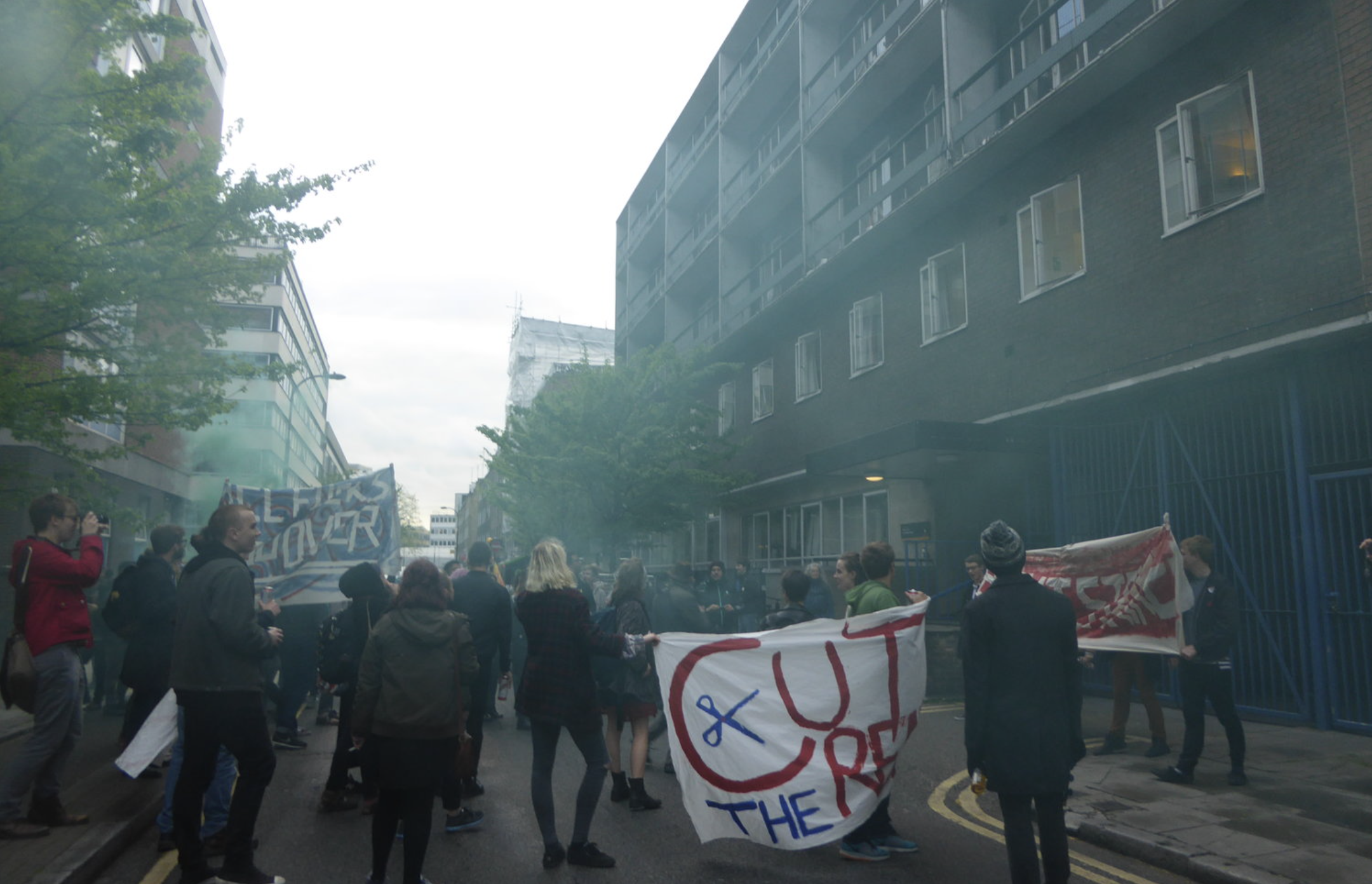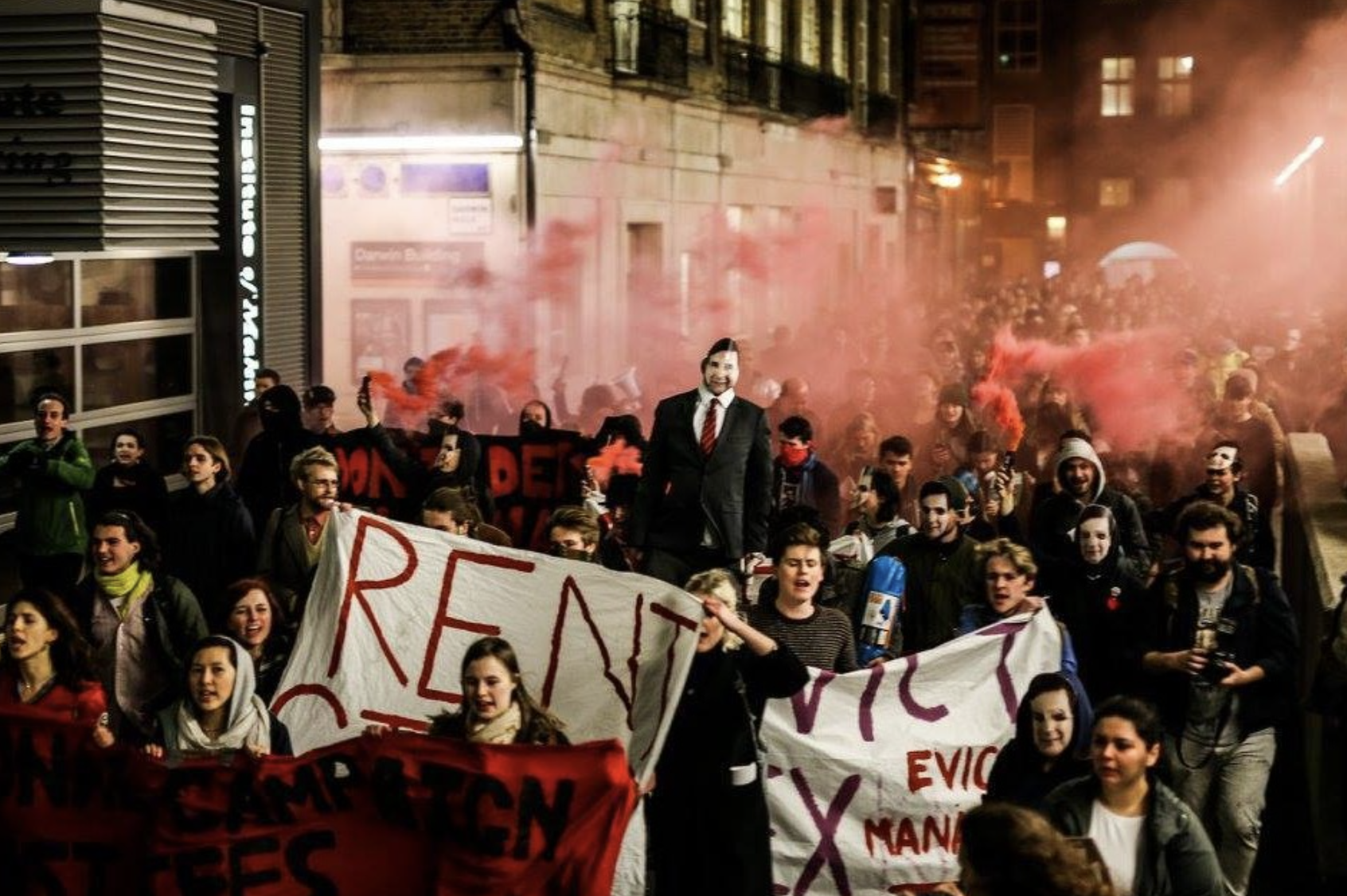Why We Strike
Rent is everyone’s problem: so we doubt we only speak for ourselves when we say our lives are being crushed under its dead weight. Students are often told they are privileged in society, yet students today are facing many crises. A mental health crisis, a crisis of capitalism - resulting in the creation of the first generation poorer than their parents, a crisis of debt, a crisis in housing to name but a few. These crises do not exist within a vacuum, and so to attack one is to alleviate the effects of the others.
Currently the housing crisis is completely out of control. 40% or more of one’s paycheck is spent entirely on landlords who provide nothing to society, leaving us with very little room to live our lives in a healthy and constructive way. What rent strikes do up and down the country is take back control of what has been stolen from us from ripoff letting agents to unsympathetic universities who care more about their management’s wages than whether the students who make up their institutions are properly fed. The latter is often no better than the former, in many cases they are worse. For example, at Sussex University the average cost for a room is £125, which gives you access to poor quality accommodation often plagued by damp and rodents. For the same price in Brighton, the second most expensive city in the UK, you can get a double bed, a nice kitchen, living space and a garden.
It is for these reasons Cut The Rent campaigns have sprung up everywhere from Aberdeen to Sussex with the most notable being UCL. These campaigns aim to make on-campus accommodation more accessible for the economically disadvantaged, the marginalised and the physically disabled. However, without a full-blown movement for a free and democratic education these campaigns act at most as a bulwark to the full marketisation of universities. Universities running as businesses mean that students are seen as numbers, staff are put on more precarious contracts and pay, and money is diverted to expensive PR, advertising and management salaries - the aim of which is to make the university look good, rather than actually be good.
So why has rent increased in university accommodation so much? The answer to this lies in the higher education reforms implemented in 2010. Although much of the media focused on the tripling of fees, actually a number of other very drastic policies were implemented. Up until 2010 university funding came largely from government subsidies. This meant that universities had more or less secure incomes every year. However, in 2010 this funding was completely cut and channeled instead into a system totally relying on fees and loans. This means that universities had to “compete” via advertising and PR for students and look for other ways to make their income more secure—and increasing rent is one of these ways. However, these rent increases are totally unjustified—especially as many university managers are given ever higher pay packages as well as shiny buildings and installations to impress incoming students and businesses.

Put simply: any call for free education must acknowledge the vital role rents play in the continuation of the current university system. Yet far from being a distraction, this state of affairs offers great opportunity - the resistance can begin at home. Rent strikes offer a means with which to directly interfere with the financial health of universities in a way which ensures the manager’s attention. Just as our debt and labour produce the rent demanded of us, we reproduce the demand for rent every time we willing pay it. Our collective refusal to submit to exploitation amounts not only to grit in the gears of the university’s financial machinery, but a mechanism with which to build the collective power we need if we are serious about escaping our current situation.
Such an approach is already yielding promising results. In 2016, over 1,000 rent-striking students at UCL won over £1.5 million in concessions in the form of compensation, bursaries and rent cuts. Despite eviction threats and attempts to victimise individual students, a collective refusal to be divided or bullied - alongside careful organisation with off-campus groups - forced successive capitulations by managers. When they ignored us, we occupied their offices until they listened. When they threatened to crush us, we expanded the rent strike. When they hit us, we hit back - harder. We won: they lost. And this all on one campus: imagine the possibility if we were to strike back together, in action unified across the country… Another world is not only possible but within our reach: rent strikes have demonstrated their potency in winning concessions, at a time when the government has signalled its intention only to intensify our misery. We cannot wait for the benevolence of the wealthy and the ruling classes to improve our situation any more than we can wait for Jeremy Corbyn. When we already suffer the indignity of an existence that uses every waking moment to further our exploitation, the time for action is not tomorrow, but today.
So although the short term goal may be about getting a few quid in a student’s pocket, the end goal is the resistance to marketisation of both universities and, more importantly for the working classes, housing. It is our collective action that can take housing out of profit so that we no longer have to bear the exploitation of not only our labour but also our existence. And it is this mindset that can create a society where everyone has access to home, no matter their lack of means.

So what can you do? The following are only a few suggestions; we are sure you’ll have more:
-
Find your friends, it only take a few people - five students and a photocopier can do more damage to an institution than an army.
-
Organise a meeting and talk about the rent, figure out your demands and write them everywhere: the newspapers, your leaflets, the walls…
-
Start a petition demanding rent cuts and threatening rent strikes if enough people sign, take it door-to-door round the halls, collect emails and phone numbers: phone everyone!
-
Build a common identity: put up posters and throw parties; figure out how to cook collective meals, hold protests, intimidate management and resist an eviction
-
Get in touch with other campuses, support + learn with each other; share skills and tips
The future will contain what we put into it today: see you soon.